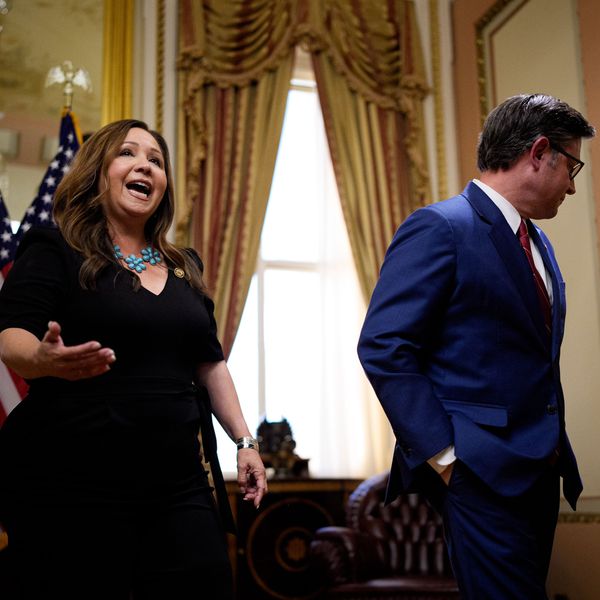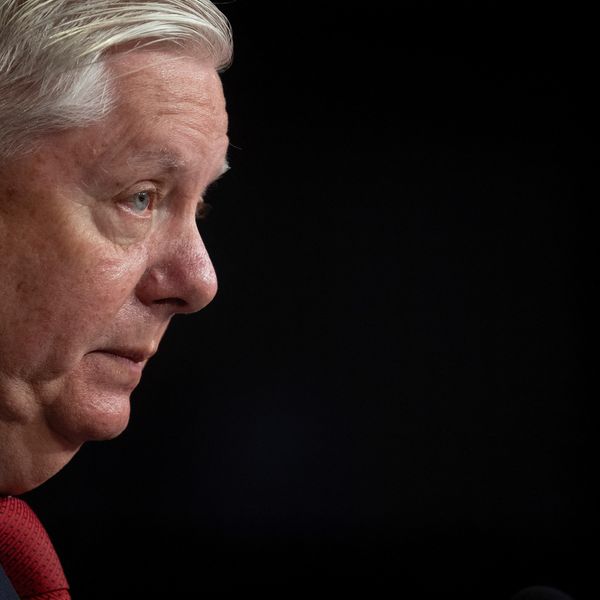Gonzales Lied Before, to Congress
It turns out that Attorney General Alberto Gonzales lied to reporters on March 13 about the scandal over the fired prosecutors.
At that time, Gonzales said he "was not involved in any discussions about what was going on" with the firings.
"On Friday night, however, the Justice Department revealed Gonzales's participation in a Nov. 27 meeting where such plans were made," the AP reports.
He was in on a very detailed discussion of a "five-step plan for carrying out the firings of the prosecutors," according to the AP story, which cited Gonzales's aides as well as documents the Justice Department released Friday night.
But this is not the first time the Attorney General has lied.
He also lied--to Congress--back in January 2005, during his confirmation process.
According to a March 6, 2005, article in The New York Times, Gonzales submitted a written response to a question from a Senator about the Bush Administration's policy of "extraordinary rendition."
Here's what Gonzales said: "The policy of the United States is not to transfer individuals to countries where we believe they likely will be tortured, whether those individuals are being transferred from inside or outside the United States." He added that he was "not aware of anyone in the Executive Branch authorizing any transfer of a detainee in violation of that policy."
But, when Gonzales was White House counsel, Bush signed a directive shortly after 9/11 that authorized the CIA to transfer suspected terrorists to foreign countries for interrogation. Human Rights Watch and Amnesty International estimate that the United States has transferred between 100 and 150 detainees to countries notorious for torture.
So when Congress looks into Gonzales's role--and integrity--in the sacking of the prosecutors, they may also want to investigate his role--and integrity and possible criminality--in the much more serious scandal of exporting prisoners for torture.
(c) 2007 The Progressive
An Urgent Message From Our Co-Founder
Dear Common Dreams reader, The U.S. is on a fast track to authoritarianism like nothing I've ever seen. Meanwhile, corporate news outlets are utterly capitulating to Trump, twisting their coverage to avoid drawing his ire while lining up to stuff cash in his pockets. That's why I believe that Common Dreams is doing the best and most consequential reporting that we've ever done. Our small but mighty team is a progressive reporting powerhouse, covering the news every day that the corporate media never will. Our mission has always been simple: To inform. To inspire. And to ignite change for the common good. Now here's the key piece that I want all our readers to understand: None of this would be possible without your financial support. That's not just some fundraising cliche. It's the absolute and literal truth. We don't accept corporate advertising and never will. We don't have a paywall because we don't think people should be blocked from critical news based on their ability to pay. Everything we do is funded by the donations of readers like you. Will you donate now to help power the nonprofit, independent reporting of Common Dreams? Thank you for being a vital member of our community. Together, we can keep independent journalism alive when it’s needed most. - Craig Brown, Co-founder |
It turns out that Attorney General Alberto Gonzales lied to reporters on March 13 about the scandal over the fired prosecutors.
At that time, Gonzales said he "was not involved in any discussions about what was going on" with the firings.
"On Friday night, however, the Justice Department revealed Gonzales's participation in a Nov. 27 meeting where such plans were made," the AP reports.
He was in on a very detailed discussion of a "five-step plan for carrying out the firings of the prosecutors," according to the AP story, which cited Gonzales's aides as well as documents the Justice Department released Friday night.
But this is not the first time the Attorney General has lied.
He also lied--to Congress--back in January 2005, during his confirmation process.
According to a March 6, 2005, article in The New York Times, Gonzales submitted a written response to a question from a Senator about the Bush Administration's policy of "extraordinary rendition."
Here's what Gonzales said: "The policy of the United States is not to transfer individuals to countries where we believe they likely will be tortured, whether those individuals are being transferred from inside or outside the United States." He added that he was "not aware of anyone in the Executive Branch authorizing any transfer of a detainee in violation of that policy."
But, when Gonzales was White House counsel, Bush signed a directive shortly after 9/11 that authorized the CIA to transfer suspected terrorists to foreign countries for interrogation. Human Rights Watch and Amnesty International estimate that the United States has transferred between 100 and 150 detainees to countries notorious for torture.
So when Congress looks into Gonzales's role--and integrity--in the sacking of the prosecutors, they may also want to investigate his role--and integrity and possible criminality--in the much more serious scandal of exporting prisoners for torture.
(c) 2007 The Progressive
It turns out that Attorney General Alberto Gonzales lied to reporters on March 13 about the scandal over the fired prosecutors.
At that time, Gonzales said he "was not involved in any discussions about what was going on" with the firings.
"On Friday night, however, the Justice Department revealed Gonzales's participation in a Nov. 27 meeting where such plans were made," the AP reports.
He was in on a very detailed discussion of a "five-step plan for carrying out the firings of the prosecutors," according to the AP story, which cited Gonzales's aides as well as documents the Justice Department released Friday night.
But this is not the first time the Attorney General has lied.
He also lied--to Congress--back in January 2005, during his confirmation process.
According to a March 6, 2005, article in The New York Times, Gonzales submitted a written response to a question from a Senator about the Bush Administration's policy of "extraordinary rendition."
Here's what Gonzales said: "The policy of the United States is not to transfer individuals to countries where we believe they likely will be tortured, whether those individuals are being transferred from inside or outside the United States." He added that he was "not aware of anyone in the Executive Branch authorizing any transfer of a detainee in violation of that policy."
But, when Gonzales was White House counsel, Bush signed a directive shortly after 9/11 that authorized the CIA to transfer suspected terrorists to foreign countries for interrogation. Human Rights Watch and Amnesty International estimate that the United States has transferred between 100 and 150 detainees to countries notorious for torture.
So when Congress looks into Gonzales's role--and integrity--in the sacking of the prosecutors, they may also want to investigate his role--and integrity and possible criminality--in the much more serious scandal of exporting prisoners for torture.
(c) 2007 The Progressive

